by Commander Albert A. Morel, Jr. for ALL HANDS MAGAZINE, the official magazine of the U.S. Navy. Published April of 1972.
EDITOR’S NOTE: (Albert Morel III) I love reading my father’s prose — half literary — half military report. It was an amazing experience. Around the world in 4 years. We lived in Yokosuka, Japan and Subic Bay, Philippines. Camping trips across the U.S. and Europe. And after circumventing the globe we landed back just miles from where we started. Starting in Fairfax, VA and ending at Cheltenham Naval Communications Station in Clinton, MD, my father’s last duty station before retirement.
Not surprisingly, I see the camping trips slightly different. As the oldest of 6 children, I was tasked with heading up setting up and breaking down camp. Not the sort of thing an adolescent is excited about at O-dark-hundred in the morning before driving all day to find the next campsite and start all over again.
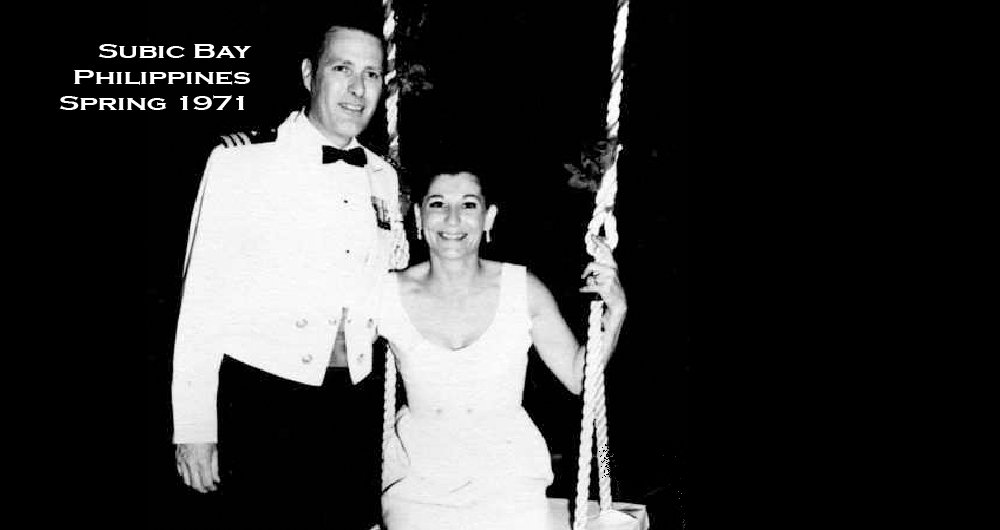
But the truth is, my parents were incredibly courageous people. And raising a family of 6 offspring is rare in the service. In fact, I only remember one family that was close and that was in Japan and they had seven. That would be my friend Jeannie Hamill. Her older brother, Mark, was a BMOC at the high school. Mark Hamill would go on to be Luke Skywalker. But that is a story for another day. –AM
The Odyssey of a Navy Family
Here is a story that is living proof of the recruiting poster’s slogan “Join the Navy and See the World.” Navy men sometimes forget that the words apply not only to themselves, but to their families as well.
The Morel family grasped at the opportunity when it presented itself. Their odyssey not only shows what can happen, but also how things can be made to happen if one looks opportunity in the face and takes advantage of what it offers.
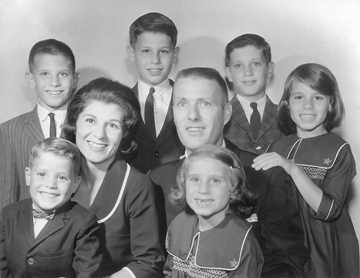
Despite the last-minute leg fracture suffered by their 11 year old at the beginning of the journey and other minor disasters such as careening down a mountainside in a car without brakes, the journey provided thrills, excitement and a chance to meet people on four continents. This is their on-the-spot report.
A Navy commander, his wife and six children recently completed a trip that took them around the world. It lasted four years and included two tours of overseas shore duty. While crossing the United States and traveling in Europe, they lived in a tent. In between, they saw the sights, ranging from the Grand Canyon to the Coliseum, and made themselves at home in Canada, Hawaii, Japan, the Republic of the Philippines, India, Spain, France, Austria and Italy, to mention just some of the places visited. They ended up 30 miles from their starting point — some 35,000 miles later.
In 1967, Commander Albert A. Morel, Jr., was in the Bureau of Naval Personnel and lived a short distance away in Fairfax, Va., when he was ordered to Fleet Activities, Yokosuka, Japan, with 30 days leave en route. Normally, this would mean a visit with relatives who would not be seeing the family for a few years. In addition to his wife Joan, there were the six children, ranging in age from 6 to 12 years; logistical planning had to be on a large scale.
The family had always been on the east coast, with duty stations from Norfolk to Boston. It was decided that this was the ideal opportunity to see some of the United States with the initial idea to camp out across country. No one in the family had ever camped out, so the idea was to decide where to go, how to go, and what was needed.
First step was to obtain a car that would be reliable, get them across the United States, and also be suitable for use overseas. One of the Morels’ neighbors ran a used car lot and had a good nine-passenger late model station wagon with dual air-conditioners. With brakes relined, a new set of tires and heavy duty shock absorbers, the basic transportation was ready to go.
A family gathering back at home relives the excitement of the global tour.The camping equipment included a 9-by-15-foot tent with outside supports, eight sleeping bags, eight air mattresses, a space heater, lantern, three-burner stove, oven (never used), table, tarpaulin, cooler chest and lots of paper plates, cups and plastic utensils. Some old pots and pans rounded out the camping gear. A set of lightweight luggage was purchased so everyone could have his own bags. A portable television that could operate on a battery or cigarette lighter also was added.
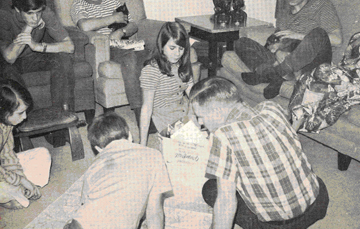
With the aid of a road atlas and a camping guidebook, their departure from the east coast was scheduled to coincide with the opening of EXPO 67 in Montreal, Canada-an excellent starting point. Such a schedule would permit visiting with relatives and friends, and gave just over three weeks on the road to make connections with the MAC flight from Travis Air Force Base on 30 May 1967.
The family furniture was placed in storage, and a farewell party was arranged. During that party though, Robert-number three son-fractured his leg while playing football in the yard. Joan took him to a hospital but the fracture was not discovered. The following morning, X-rays at Main Navy Dispensary revealed the fracture, and later a cast was put on at Bethesda Naval Hospital.
You have to be flexible when something like this happens. The itinerary was reviewed to see where the family would be in three weeks when it was time to remove the cast, and it was decided that a two-day stay at Fort Leavenworth, Kansas, would fill the bill. Due to the location of the fracture, Robert could not put any weight on his foot. A wheelchair was rented and, when the cast was removed later, the rig was shipped back to some friends.
It would be best to sell the house, the Morels decided. They set a price, spruced it up, and sold it to the first viewer. With all the luggage and camping gear, they obtained a rental trailer that just held everything except the wheelchair which was carried on top of the car. The trailer was later left on the west coast.
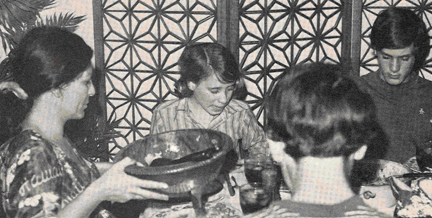
The children were attending school in Fairfax and all were given their promotion papers before departure to begin the longest summer vacation of their lives. The big day arrived on 24 April. At about 2000, after cleaning up the house, everyone was loaded into the car. They made a couple of final farewells and headed for Hudson, Mass., the hometown of both Commander and Mrs. Morel. The next two weeks were busy with parties and saying goodbye to relatives and friends. It was also the last chance for Maine lobster for a long time.
Early on 8 May the real adventure began as the family headed for EXPO 67. As they approached the Canadian border, the rain began and it was midnight when they arrived at the campsite. The area was unlighted and the clerk said they could use any space they desired, as there was only one other car there. As they drove into the area, the combination of the rain and the added weight on the rear of the car proved too much, the rear wheels sank into the mud. In the back of the car, the seats had been put down and the children were sleeping. The rain was heavy, so the commander kissed his wife goodnight, wished her a happy 14th wedding anniversary and it was all quiet.
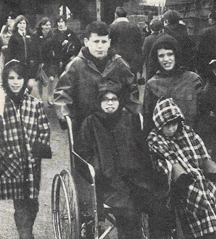
As it turned out, the campsite was still under construction and wasn’t really ready. In the morning a construction crew used a bulldozer to pull the car from the mud-and the family went to a motel. The next two days were spent touring EXPO exhibits and enjoying the sights.
The first night of real camping was along the northern shores of Lake Erie. After a hearty meal, Joan decided to go into a nearby town and get some laundry done. The entrance to the campsite wasn’t well lighted and. as she was returning; she turned too soon and ended up partially down an embankment with the front wheels in the air. With help from some truck drivers, they were able to get the car back on the road. There didn’t appear to be any damage, but they had the front end aligned and the wheels balanced, just to be safe.
After an enjoyable day at Niagara Falls, they had an uneventful trip to Fort Leavenworth, arriving on schedule. The Army had set aside a portion of the Boy Scout area and-as it wasn’t in use-they were permitted to use the campsite. It was about one-half mile to the nearest building and the site had large fireplaces, plenty of wood and was well cared for there were trails through the woods and long vines in the trees; the children had a great time and swinging in the trees. CDR Morel figured Robert might be in need of a cast for his other leg before the Army doctors could get the old cast off –but everything turned out O.K. The hospital removed the cast-everything had healed nicely.
As the family was leaving the base, Joan discovered the Army had guesthouses that could have been used instead. She was thinking of the three hours night before, heating water on the fireplace, in order to give the children baths.
By the time, the family had discovered that they were taking too much time at the campsites, so the schedule was revised and they decided to camp out every other day. In between, they would take turns driving until tired, and then park along the road. This gave them more time to see sights and when they camped, they would prepare meals. The rest of the time, they would eat in the car, at roadside areas, or, once in a while, in a restaurant. Morel and the boys would set up the tent; Joan and the girls would do the cooking.
The Petrified Forest and the Grand Canyon made definite impression on the children. One night while camped in the Grand Canyon, Sarah, nine, came running to the campsite and said that Margaret, eight was “real sick” in the bathroom – she had bad cramps and could barely stand up. Turned out, she had found a package of chocolate laxatives – and the candy was her undoing. A doctor’s bill of $15 was the result.
One of the must stops was Sandia Peak where you can see four states from a single peak. There they had another adventure that they could have done without. Just as the car started down, Morel discovered that the brakes were not working as they should. By Pumping the pedal and using the emergency brake, the car could be stopped so they continued cautiously. They took a back road down – but after a couple of hundred feet, it turned into a dirt trail. It was a hairy ride, with hairpin turns, cliffs and inclines. A couple of times the parking lever was needed to stop the car. As soon as they reached civilization, they sought help. It turned out that a brake seal had broken. After a complete safety check, everything was again in good shape.
Boulder Dam, the Strip at Las Vegas, Yosemite National Park and the giant redwood trees rounded out the first leg of the trip. By this time, the family felt they were experienced campers. The last day on the road was spent visiting relatives outside San Francisco. The children continued to camp out, sleeping in the tent in the back yard, while husband and wife had the guest room.
The family arrived at Oakland and made a partial shipment of all the camping equipment. This was followed by some sightseeing in San Francisco and a final stop at a motel outside Travis AFB. The following day, transient quarters were obtained at Travis for the final night in CONUS, while the trailer was turned in and arrangements were made for shipping the car. There are commercial companies outside the base that will take care of all the paperwork for shipping a car for only $20 and you can have the use of your car until an hour before flight time.
With a show time at 0800 the next morning, it took two trips to get the family and the 480 pounds of luggage to the terminal. After a short stop in Hawaii, the family arrived in Japan-at Tachikawa Air Force Base-where they were met by their sponsor. The family had been advised that there was then a 12 month wait for housing in Japan. As it turned out, a five bedroom unit unexpectedly became vacant and Morel and family moved in after only three nights in the local Navy Lodge.
CDR Morel served as Yokosuka’s security officer and administrative officer-with a sizable collateral assignment as the mess treasurer of the Commissioned Officers’ Mess (open). The tour was thoroughly enjoyed by the entire family and they made many friends among the Japanese people.
Because there’s so much to tell-and because the story of duty in Japan has been told many times in ALL HANDS, we’ll pass over this aspect of the Morel’s Odyssey with the comment that the whole family would like to go back for another tour.
Although this was supposed to be a three-year tour, there suddenly was a need for a relief as the Executive Officer at Naval Station Subic Bay. CDR Morel was selected and, despite the change of assignments, the transfer was relatively easy. The family arrived in the Republic of the Philippines on 5 Feb 1969-and moved right into quarters where the sponsor had even stocked the refrigerator. The children only missed one day of school on this transfer.
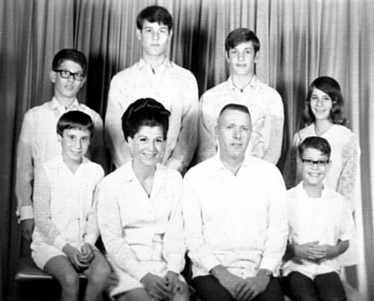
The tour of duty inn the Philippines also made a hit with the entire family. While at Subic, CDR Morel noted that some of the bachelor officers and young married couples had found an opportunity to return to the States via Europe. When he in turn received his orders as the executive officer at the Naval Communication Station Washington (his present duty), he checked into the method that others had used. In the other cases, the travelers had gone “space required” to New Delhi, India, and then space available to Torrejon, Spain.
With eight members in the family, however, and only a weekly flight available, Morel could not take a chance of being stranded en route. He requested confirmed reservations from Clark Air Force Base to New Delhi and from New Delhi to Torrejon. After a three week wait, the entire flight was confirmed. Now it was time to make all the other plans.
It would have been financially advantageous to have purchased a car for delivery in Madrid, even considering the extra costs for freight and taxes. However, it had been some years since the commander had driven in real traffic, and having heard so many stories about Europe, he decided it would be better to rent a car. Finally arrangements were made with Auto-Europe. The actual cost for rental of a nine passenger mini bus for 25 days of unlimited mileage was $540 including all required insurance. Delivery of the vehicle in Madrid was confirmed for a $3 fee. An International Drivers Permit was obtained for the commander and his wife.
Arrangements had to be made to get from Europe to the States. Space available travel for eight was out of the question, so rates and schedules were requested from several airlines and charter agencies. For a total of $520, reservations for the family were confirmed from Frankfurt, Germany, to the U. S. This gave everyone peace of mind in knowing they wouldn’t be stranded in Europe.
A rough itinerary was planned: it was decided that the family would camp out, not cook any meals and the schedule would be very flexible. They purchased-a copy of “Europa Camping and Caravaning.” It listed all the campsites in Europe and graded them. Another basic book was “Auto Europe” which contained all the driving requirements in each country and recommended routes between cities, with distances–in miles, kilometers and the like. It was planned that the family would be only one day away from Frankfurt during the last week.
Tourist information was obtained and the packages contained a wealth of information about each country and the attractions. Each one also contained a road map.
The old tent was set up and minor repairs were made. In order to carry it, two sea bags were sewn together. This held the tent, including tarpaulin, poles and stakes, and weighed about 120 pounds. Three additional sea bags were used for the sleeping bags. Air mattresses were not taken to Europe due to previous arguments about who had to inflate them and the time involved. It was discovered later that the ground in Europe was very hard, although no one was to have any trouble getting to sleep. Immunizations also were brought up to date.
In order to provide a cushion for unexpected expenses, Morel obtained an American Express Credit Card which proved very useful in changing money, buying souvenirs and cashing checks. It allowed the family to eat in some of the better restaurants and available cash would not be depleted. It’s a wise investment for a traveler, although – like everything else – one has to pay eventually.
On the morning of the 16th, quarters were vacated and the family went by sedan and rented minibus the 50 miles to Clark AFB. It was the monsoon season in the Philippines and rain fell all day. The rain was almost a solid wall of water. It took three hours to make ·the trip, an hour longer than usual. They were fortunate to leave early in the day, as one of the bridges on the main road became flooded and many other people did not get through that night.
Berthing at Clark was at the base motel; the sleeping bags came in handy that night. The next morning, three taxis were lined up to take the family and luggage to the air terminal; the family was ready to begin its European journey.
The first day, the MAC flight, known locally as the Embassy Flight, stopped at Saigon, Bangkok and finally New Delhi. No one was permitted to deplane at Saigon, but – there was a restful two-hour ground time at Bangkok. This was an opportunity to add to the family souvenir collection from countries visited.
New Delhi was an overnight stop for crew rest and everyone was taken to the U. S. Embassy for money exchange, guidance and flight confirmation. This was completed by 2000. Hiring transportation (they needed two vehicles), the Morels went to a hotel where the minimum rate for the family was announced at $50 for the night! The family decided there were better ways to spend money. They took a tour of New Delhi, visited a temple, went to a “sound and light” show, and had a wonderful native dinner, returning to the terminal at 0100, where the family slept on couches while the commander wrote postcards, listened to the radio and drank coffee. By 0800 they were airborne again.
The second day, stops were made in Karachi, Dhahran in Saudi Arabia, and finally Torrejon, just outside Madrid. The airport at Dhahran had a brand new, beautiful, air-conditioned facility, and the major activity was the Embassy Flight. At Torrejon there were only two commercial taxis on the base- everyone was on his own. The Morels managed to hire one, which transported Joan and three of the children on to Madrid. About an hour later they were able to obtain the second taxi, which followed with the rest of the family. It was a tight squeeze. Taxis in Spain are small affairs and both were fully loaded by the time luggage was added.
Staying in a hotel about a mile from the center of the city, they had what was to be their last comfortable night, and everyone made the most of it. Although it was after midnight before everyone got to bed, reveille was early the next morning and the day’s plans were made over a leisurely breakfast.
Joan hired the required two taxis and took the children sightseeing in the palace and museums; the commander contacted the car rental company and
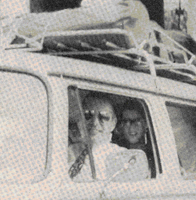
was told his car had just arrived from Denmark. Morel got to the agency-after 30 minutes of zigzag driving – and decided he had better keep the taxi as a guide to be able to get back to the hotel. The car was a beauty – a brand-new minibus with luggage rack.
It turned out that the gas tank was empty and this was the commander’s first experience with the cost of European gasoline. It cost $10 to fill up. Each day of the trip cost $8-$10 for gas, more than had been planned. Now the Morels knew why Europeans drive small cars. The taxi, which he had used for well over an hour only cost $2.50, including tip.
In Spain, the family began its European camping tour in a rented minibus. Fun and education were combined during the transcontinental camp-out.
Checking out of the hotel, they spent the next hour storing luggage in the bus. The tent, sleeping bags, and two suitcases were carried on the roof. Remaining luggage went into the luggage area and left an opening in the rear window about six by 12 inches. Everything fit into place, with the aid of 11 feet of clothesline used to lash down the luggage rack. With the local sightseeing finished, everyone loaded into the car and the journey began.
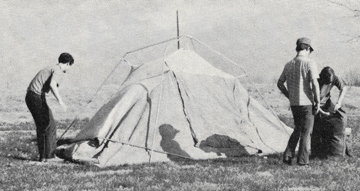
A pattern was set right away. After reviewing maps, a target was established for each day, and Joan would study the camping guide, selecting a site along the road being traveled. Arrival at each site was timed around 2000. There, Albert III, now 16, Michael 15, and Robert 13, would set up the tent and arrange the sleeping bags. Joan would take the two girls, tour the campsite and check out facilities, while Richard, 10, was assigned to clean out the car. (The commander would adjourn to the snack bar for a cold beer.) Most of the campsites charged for hot showers and sometimes the hot water would run for only a minute at a time. It took plenty of change to keep everyone clean.
Everyone’s eating habits were given free rein. As the water was considered unsafe, all had a choice of local beverages or soda with each meal. Almost all the meals were local dishes enjoyed by everyone. The kids had an opportunity to taste the family wines which were offered, but showed considerable restraint and would seldom have more than a small glass, especially after Richard got sick once when he thirstily downed two glasses after a particularly exciting day.
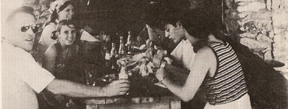
Breakfast each day consisted mostly of fruit juice, sweet rolls and milk or soda. After a couple of mornings with the warm milk that Europeans prefer, the children stuck to soda. While traveling, they always carried a large bag of snacks and sandwiches. The roadside stands had plenty of peaches, tomatoes and other farm produce available.
On the first leg of their European camping tour, the commander got lost for almost two hours trying to find the road to Barcelona. This was to happen in all the large cities, but turned out to be a good way to see some of the sights. They finally got on the main road and after two hours stopped for something to eat. The restaurant had all kinds of food behind the bar, so the family had their first popular Spanish-style olives, sausage and hard bread.
Bullfights in Barcelona are held on Sunday. After a night in the tent, the family arrived at the arena in mid-afternoon. After the first few events, all were ready to leave. This was one local custom the youngsters could not enjoy, since the bull always lost.
The next few days, the Morels wound their way along the Riviera, from Spain, to France, to Monaco, and finally into Italy. Campsites were along the water and sleeping was comfortable. The alarm clock always got everyone up at 0700. Although there were grumbles in the early morning, the family appreciated the day better than the sack. In Villefranche and Nice, the family snacked at sidewalk cafes where the commander had sipped wine during previous Mediterranean cruises. While sightseeing at the Leaning Tower in Pisa, they discovered that Camp Darby, a U. S. Army base nearby. While Joan spent five hours with washers and dryers at the laundromat, the rest of the family visited the exchange and snack bar. Then it was on to Rome.
There, the campsite was about six miles from the city. Some campers were living in relative comfort and large tents, with cots and all the conveniences. Others, mostly students, had only a tent and a small amount of clothes. At this campsite there was an elderly British couple. They got up at six each morning and, a half-hour later, the husband would be dressed and reading his newspaper, while the odor of his wife’s cooking would be all over the camp. They were seeing Europe in a leisurely fashion. Although most campsites were fenced and guarded, there never seemed to be any concern about security during the entire trip.
The Morels spent almost a full day touring the Vatican. Before they had left the Philippines, Richard, who had been an altar boy at the base chapel, wrote to Pope Paul and requested an audience. After the tour, Richard decided to find out what had happened to his letter. He talked himself through two sets of guards and disappeared into a building. In about 15 minutes he returned and asked his mother to join him and then his father. His letter had been received, and the family could have an audience.
However, the Pope was discontinuing the so-called private audience and the next audience would be in four days, during which he would dedicate his new audience auditorium. The priest in the Secretariate said that the family tickets would be available on the morning of the audience.
A visit to the Rome Zoo rounded out the day. Just inside the gate of the zoo, there was a tiger lying on a bench, tied with just a piece of rope. For a small charge, you could have your picture taken, arms around the neck of the tiger, if you had the courage. The younger Morels decided to forego this opportunity.
A must visit to Italy is a tour of Pompeii and the ruins. There are many areas of the city that have been restored and some of the original murals can be seen clearly. The cameo factory outside the city contained many beautiful items, but far too expensive. The manager explained that pretty soon there will no longer be cameos, as the younger men in Italy do not have the patience to do the fine work and he is unable to hire anybody.
Naples is still the favorite Navy city. While CDR Morel was visiting the Navy, picking up his pay, Joan and the children toured castles and museums. Joan was wearing a black sweater and black slacks and found out that the color worn by a woman accompanied by children has a special meaning to Italian men. By the time her husband picked them up, she was more than ready to leave.
The next day, it was time for the audience with the Pope. It was a very impressive ceremony, with a large number of pilgrims from all over the world. The auditorium is the first new construction in the Vatican in over 75 years. The seats for the family were in the sixth row and they had a good view. During the audience, the Pope made a special announcement in Italian. There was a groan from the audience. A bishop sitting behind Albert said that the Pope had just received word of the deaths of the Russian cosmonauts. After the audience, the Pope came down to the people and Richard was able to make his way through the crowd to touch the Pope’s hand. It was a complete day for everyone.Afterwards they toured the Coliseum and other ancient ruins of the Roman Empire.
On leaving Rome, the Morels ran into the only rain to mar their entire trip. They were headed towards Assisi when it started and by the time they arrived, it was coming down heavily. They set up the tent in an orchard which had been converted to a campsite.
The local restaurant was a converted cellar of a big old barn. It was a family type operation, with an open fire for cooking. What with the rain and the altitude, it was chilly, so the fire felt good.
Then a group of young men came in and soon started singing. Visitors and natives alikesat around having a good time-eating, singing and chatting family style. Even the weather cheered up. By the time the Morels left, the rain had stopped.
The next day the schedule called for another move, and they headed for Venice. Arriving late at the campsite along the Adriatic Sea, the Morels found that by the time their camping gear was set up, the restaurant had closed. Everyone was starved by then, so they all piled into the car to find a meal. Everywhere they went, they found they were too late. But at one spot, the cook and waitress in the restaurant were eating and the chef, a stout, jolly man took pity on them. He hailed them into the kitchen, and opened the oven where he had a dozen large stuffed green peppers left over. On the stove he pointed to some zucchini. Although there was the old language barrier, his hospitality was more than evident. By the time they left, the Morels were ardent Italian food fans. After everyone was served, the cook came out and started serving “vino.” He filled each one’s glass with the local wine even the youngsters’. It was a terrific meal and the bill was less than $10. That cook, the Morels decided, practiced the people-to-people program from an Italian viewpoint.
In Venice, the Morels selected a gondola. For a $15 fee they were able to take a one-and-a-half-hour tour along the canals. (For another $5 the could have had an accordionist to play and sing for them, but when they discovered this, it was too late.)
For sentimentalists, no trip to Europe would be complete without a visit to Vienna. After a night alongside one of the Austrian lakes the family arrived. First on their itinerary was a visit to the Royal Stables and the Lipizzaner horses. The Morels visited the sights, and did some shopping, and had their dinner in a restaurant on top of a needle which slowly rotated above former fairgrounds. Beneath them was the Danube River and across the river, the city of Vienna. The wine served with the dinner came from grapes grown on the sides of the mountains in the background. It was a beautiful sight, with the lights of Vienna sparkling in the waters of the Danube, while the musicians, of course, played Strauss waltzes. Even the younger children were impressed.
Munich gave them their first introduction to a German city, Munich-city of cathedrals, catacombs and beer halls, the latter with waiters and waitresses in Bavarian outfits. That night, the Morels enjoyed a dinner at a large outdoor restaurant. Beer was served in large pitchers and the food was cooked right in view of the diners, at open fires. Guests who chose fish could select their own from a tank at one side of the restaurant.
Zurich was next on the list, followed by Geneva, Switzerland. The Morels camped on the shores of Lake Geneva, relaxing from sightseeing for a day. The children went swimming. Joan went to a Swiss-style supermarket and bought all kinds of snack items, which they ate using a sleeping bag for a table. The next morning it was back into the city for more sightseeing.
The commander called the charter flight agency in Frankfurt to reconfirm their flight on the 14th. He found out that their flight had been canceled, but – no sweat – they were booked to depart a day earlier. Returning to the family, who were relaxing at a sidewalk cafe, he announced that their flight had been canceled. Then, as everyone began to moan he gave them the good news that they would leave a day earlier, instead. A loud cheer went up that could be heard throughout Geneva.
The next stop, traveling via the Alps, was Paris. Even here they would camp out, particularly because the hotel bills were so steep. But the campsite they had selected was full. The manager sent them to another site a couple of miles away. They were in luck-and this one turned out to be one of the best of the trip, with excellent facilities and-for a change -plenty of soft, green grass.
The following day they visited the Louvre, the Arc de Triomphe, Notre Dame Cathedral and the Eiffel tower. When the children found out it cost $2.50 each to go up in the Eiffel tower, and the wait was about an hour, they voted to save their money and spend it for an American treat-some extra cokes.
Now came the final leg of the journey-from Paris to Frankfurt. Most of the trip was over two-lane roads, at night, with fog. As a result, instead of five or six hours, it took all night to make the trip and upon arriving in the outskirts of Frankfurt, the car had its only breakdown, a flat tire. There is nothing like changing a flat tire at six on a Sunday morning in a foreign country.
After camping their way through Europe, the Morels decided to splurge a little and stay in a hotel. But here they demonstrated what it might have been like if they had taken the hotel route all the way. One of the better hotels wanted $77 a night. They finally located one at $50 a night. It was a nice hotel, though they learned the next morning it was in the heart of the red light district. Even so – this was their first real bed in three weeks – no one was going to complain.
The early arrival in Frankfurt gave them a chance to get back to normal living for two days. Joan and the girls went to a beauty parlor at the Air Force base, while Morel and the boys arranged shipment of and other items. They spent the final day departure doing their laundry, the whole family lending a hand. Then the bags were packed. With a maximum baggage allowance of 44 pounds per they found, after everything had been packed, their luggage was 132 pounds overweight. It was too late to do anything about it.
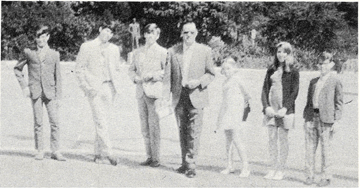
The next morning CDR Morel unloaded his family and luggage at the terminal, and then turned in the car to the agent of the rental company. They had traveled over 8000 kilometers (about 5000 miles) since Madrid on the European phase of their travels.
Back at the airport, the terminal was a madhouse, but good news-their overweight baggage didn’t cost extra. Soon the Morels were on their way with 242 passengers to John F. Kennedy in New York.
Check in process at Kennedy was completed within minutes. An hour later the family began the last phase of its four-year, ’round-the-world’ adventure in a rental station wagon.
That night, they arrived in Hudson, Mass., and in mid-July, part of the family headed for the new duty station in Cheltenham, Md. Quarters were available on base and the family was again settled in the States, just 30 miles from their old home that they left in 1967.
This is one experience that the entire Morel family will always remember. They have seen the world and have met interesting people. They have made many friends. Although the languages were different, there were never any real problem in communicating with people, no matter where.
The entire family is proud of their Navy life and also realizes that if it wasn’t for the Navy, they would never have had this opportunity. It isn’t often that an entire family can take part. Now, when the Morel children see a picture of a place they have been to or read about a country or city they have visited, they have a special interest because they have been there.
When the Navy Recruiter says “Join the Navy and see the World,” he doesn’t always mean the whole family, but in this case, it did happen.
(ALL HANDS Editor’s Note: Commander and Mrs. Morel rate a vote of thanks as well as a commendation for courage above and beyond the call of duty to shepherd a family of six youngsters on a four-year, around-the world journey. ALL HANDS also owes a vote of appreciation to CDR Morel who wrote the on-the-scene account from which this report.)
